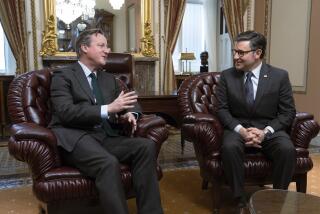Weighty Handshake for Britain, Sinn Fein : Ulster: Senior British official and leader of IRA political wing meet on U.S. soil to advance talks.
- Share via
WASHINGTON — With a handshake symbolizing the dissipating tensions between Britain and the Irish Republican Army, the leader of the IRA’s political arm and the senior British official for Northern Ireland met Wednesday evening for the first time. But, reflecting the still rocky course of the evolving relationship, officials on each side viewed the meeting from opposite poles.
From the British vantage, the handshake between Gerry Adams, the leader of Sinn Fein, and Patrick Mayhew, Britain’s Northern Ireland secretary, was nothing more than a greeting.
But it was the first meeting at such a level since Ireland was partitioned more than seven decades ago. As such, in Sinn Fein’s view, it conveyed elevated legitimacy, even respectability, on Adams, who until a few months ago was seen as a terrorist who could have been met with immediate arrest upon arrival in the United States.
Boxed into a meeting they would have preferred to have avoided, the British pressed Adams to use his influence on the IRA to disarm, and linked international investment in Northern Ireland to the advancement of peace there.
“Sinn Fein under your leadership can best promote . . . confidence and encourage jobs for Northern Ireland now by using its influence with the IRA to get substantial progress on the decommissioning of their stock of arms and explosives,” Mayhew said in a written statement issued after the brief private meeting at a downtown hotel.
With disarmament becoming a crucial next step in the peace process, Mayhew said political groups close to Protestant gunmen would be given the same message “just as bluntly.”
Because investors cannot read the minds of the paramilitary groups, the British official said, they must look to actions to guide their decisions.
“That is why there now needs to be commitment to disarm progressively and agreement on means of achieving that,” he said.
Adams told reporters before the meeting that he is willing to discuss disarming the IRA, but that the session should also cover the removal of British troops from Northern Ireland and the freeing of 800 IRA prisoners held by the British.
Earlier, Mayhew met at the White House with Vice President Al Gore and Irish Foreign Minister Dick Spring. The vice president’s office said Gore also brought up the need for disarming both the IRA and the Protestant paramilitaries.
Adams has become a familiar figure in Washington this spring as a result of the cease-fire declared in Northern Ireland eight months ago that has changed the tenor of the Clinton Administration’s response to him. Two months ago he took part in a White House celebration of St. Patrick’s Day.
The meeting between Adams and Mayhew took place at the start of a U.S. conference on economic development in Northern Ireland. Along with the conference itself, it was the most tangible result of efforts by the White House to inject itself into the peace process that has brought representatives of Britain, the Roman Catholic IRA and Protestant factions to sputtering negotiations.
Before the largely symbolic meeting in Washington, Britain said useful talks had been held during the day in Belfast with Sinn Fein over disarmament, although there were no suggestions that significant progress had been made.
In an indication of at least limited movement, Irish Prime Minister John Bruton told the Irish Parliament in Dublin on Wednesday that he had invited Northern Irish groups linked to Roman Catholic and Protestant extremists to peace talks. But it was unknown whether all the parties would participate.
The meeting between Adams and Mayhew, and the conference they are attending, are seen at the White House as dividends of the Administration’s contact with Adams--a hands-on approach that has strained Washington’s relations with the British government.
The trade conference was portrayed by former Sen. George J. Mitchell (D.-Me.), Clinton’s special aide dealing with Northern Ireland, as a step toward addressing the unemployment and economic stagnation that many believe are partly to blame for the violence there.
“This is tangible evidence of the continuing desire to further the peace process. It provides reassurance to business people that they are not going to go there and find themselves in the middle of instability and violence,” Mitchell said.
More to Read
Sign up for Essential California
The most important California stories and recommendations in your inbox every morning.
You may occasionally receive promotional content from the Los Angeles Times.










